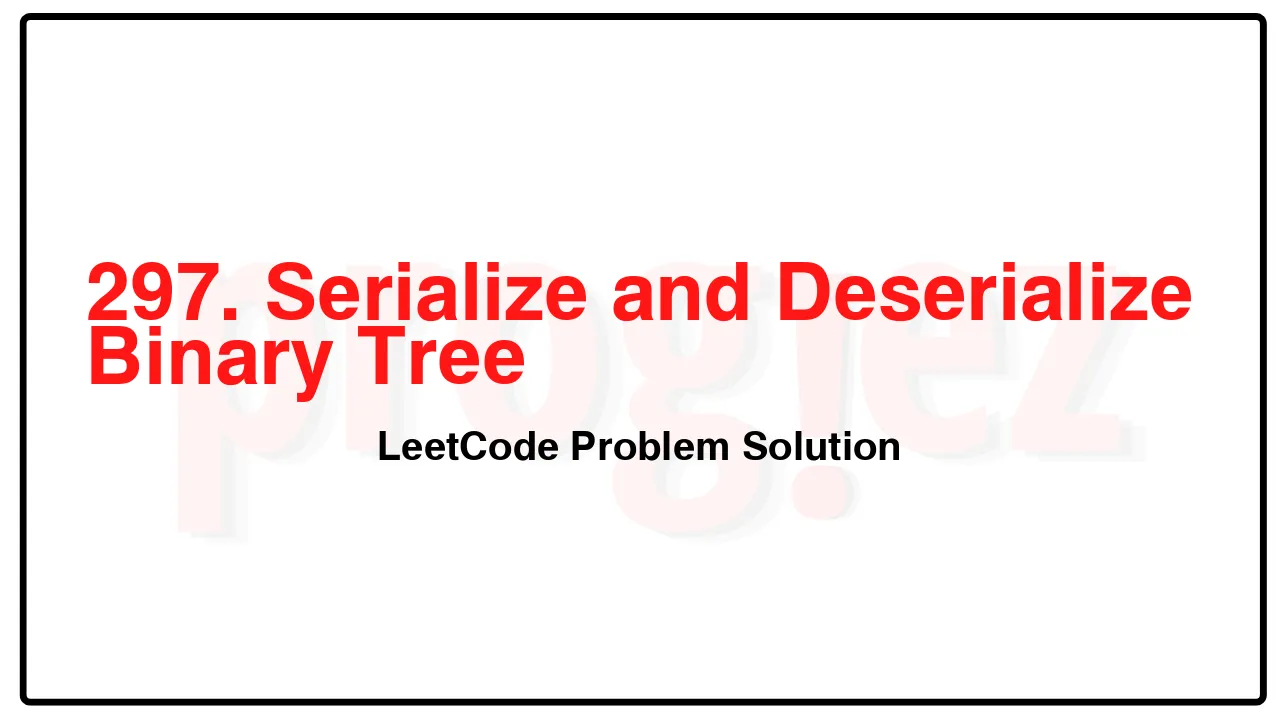297. Serialize and Deserialize Binary Tree LeetCode Solution
In this guide, you will get 297. Serialize and Deserialize Binary Tree LeetCode Solution with the best time and space complexity. The solution to Serialize and Deserialize Binary Tree problem is provided in various programming languages like C++, Java, and Python. This will be helpful for you if you are preparing for placements, hackathons, interviews, or practice purposes. The solutions provided here are very easy to follow and include detailed explanations.
Table of Contents
- Problem Statement
- Complexity Analysis
- Serialize and Deserialize Binary Tree solution in C++
- Serialize and Deserialize Binary Tree solution in Java
- Serialize and Deserialize Binary Tree solution in Python
- Additional Resources

Problem Statement of Serialize and Deserialize Binary Tree
Serialization is the process of converting a data structure or object into a sequence of bits so that it can be stored in a file or memory buffer, or transmitted across a network connection link to be reconstructed later in the same or another computer environment.
Design an algorithm to serialize and deserialize a binary tree. There is no restriction on how your serialization/deserialization algorithm should work. You just need to ensure that a binary tree can be serialized to a string and this string can be deserialized to the original tree structure.
Clarification: The input/output format is the same as how LeetCode serializes a binary tree. You do not necessarily need to follow this format, so please be creative and come up with different approaches yourself.
Example 1:
Input: root = [1,2,3,null,null,4,5]
Output: [1,2,3,null,null,4,5]
Example 2:
Input: root = []
Output: []
Constraints:
The number of nodes in the tree is in the range [0, 104].
-1000 <= Node.val <= 1000
Complexity Analysis
- Time Complexity: O(n)
- Space Complexity: O(n)
297. Serialize and Deserialize Binary Tree LeetCode Solution in C++
class Codec {
public:
// Encodes a tree to a single string.
string serialize(TreeNode* root) {
if (root == nullptr)
return "";
string s;
queue<TreeNode*> q{{root}};
while (!q.empty()) {
TreeNode* node = q.front();
q.pop();
if (node != nullptr) {
s += to_string(node->val) + " ";
q.push(node->left);
q.push(node->right);
} else {
s += "n ";
}
}
return s;
}
// Decodes your encoded data to tree.
TreeNode* deserialize(string data) {
if (data.empty())
return nullptr;
istringstream iss(data);
string word;
iss >> word;
TreeNode* root = new TreeNode(stoi(word));
queue<TreeNode*> q{{root}};
while (iss >> word) {
TreeNode* node = q.front();
q.pop();
if (word != "n") {
node->left = new TreeNode(stoi(word));
q.push(node->left);
}
iss >> word;
if (word != "n") {
node->right = new TreeNode(stoi(word));
q.push(node->right);
}
}
return root;
}
};
/* code provided by PROGIEZ */297. Serialize and Deserialize Binary Tree LeetCode Solution in Java
public class Codec {
// Encodes a tree to a single string.
public String serialize(TreeNode root) {
if (root == null)
return "";
StringBuilder sb = new StringBuilder();
Queue<TreeNode> q = new LinkedList<>(Arrays.asList(root));
while (!q.isEmpty()) {
TreeNode node = q.poll();
if (node == null) {
sb.append("n ");
} else {
sb.append(node.val).append(" ");
q.offer(node.left);
q.offer(node.right);
}
}
return sb.toString();
}
// Decodes your encoded data to tree.
public TreeNode deserialize(String data) {
if (data.equals(""))
return null;
final String[] vals = data.split(" ");
TreeNode root = new TreeNode(Integer.parseInt(vals[0]));
Queue<TreeNode> q = new LinkedList<>(Arrays.asList(root));
for (int i = 1; i < vals.length; i += 2) {
TreeNode node = q.poll();
if (!vals[i].equals("n")) {
node.left = new TreeNode(Integer.parseInt(vals[i]));
q.offer(node.left);
}
if (!vals[i + 1].equals("n")) {
node.right = new TreeNode(Integer.parseInt(vals[i + 1]));
q.offer(node.right);
}
}
return root;
}
}
// code provided by PROGIEZ297. Serialize and Deserialize Binary Tree LeetCode Solution in Python
class Codec:
def serialize(self, root: 'TreeNode') -> str:
"""Encodes a tree to a single string."""
if not root:
return ''
s = ''
q = collections.deque([root])
while q:
node = q.popleft()
if node:
s += str(node.val) + ' '
q.append(node.left)
q.append(node.right)
else:
s += 'n '
return s
def deserialize(self, data: str) -> 'TreeNode':
"""Decodes your encoded data to tree."""
if not data:
return None
vals = data.split()
root = TreeNode(vals[0])
q = collections.deque([root])
for i in range(1, len(vals), 2):
node = q.popleft()
if vals[i] != 'n':
node.left = TreeNode(vals[i])
q.append(node.left)
if vals[i + 1] != 'n':
node.right = TreeNode(vals[i + 1])
q.append(node.right)
return root
# code by PROGIEZAdditional Resources
- Explore all LeetCode problem solutions at Progiez here
- Explore all problems on LeetCode website here
Happy Coding! Keep following PROGIEZ for more updates and solutions.